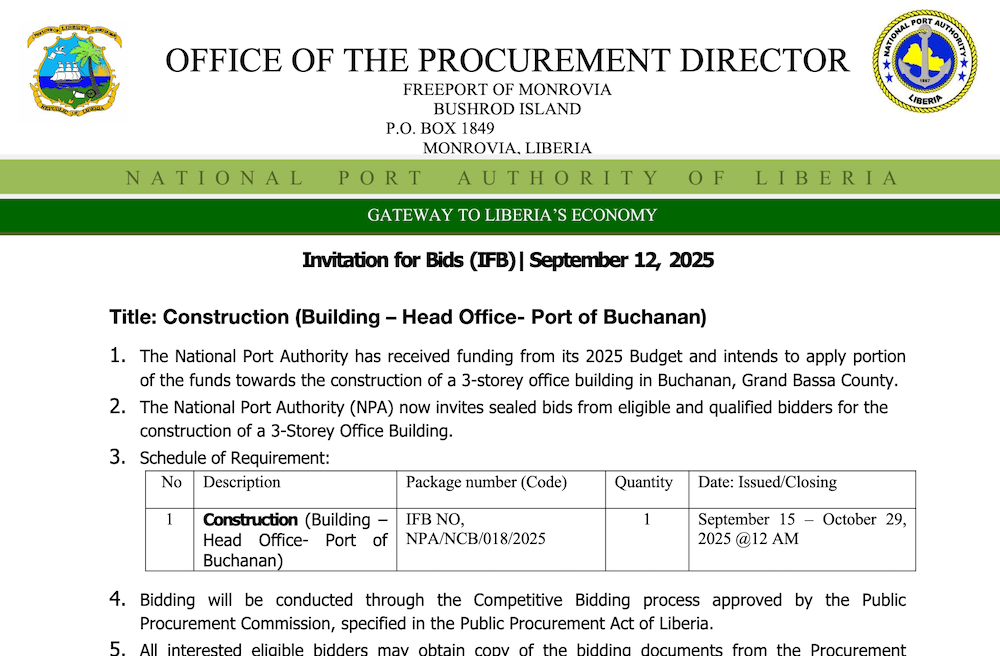The provided text snippet refers to an Invitation for Bids (IFB) for a construction project, seemingly designated as IFB-NCB-2025, published on September 12, 2025. The brief announcement suggests a potential opportunity for construction companies to bid on a project likely within Liberia, given the reference to “Liberia news The New Dawn Liberia.” While the exact nature of the construction project remains undisclosed, the provided information serves as a starting point for a more detailed exploration of government procurement processes, the role of IFBs, and their significance in promoting transparency and competition within the construction industry.
An Invitation for Bids (IFB) is a formal procurement document used by government agencies and other organizations to solicit competitive bids from prospective contractors for construction projects. The IFB outlines the project scope, specifications, required qualifications, bid submission procedures, and evaluation criteria. It serves as a crucial communication tool, ensuring that all interested parties have access to the same information, thereby fostering a fair and transparent bidding process. By publishing the IFB, the procuring entity signals its intent to award the contract based on merit, promoting competition and ultimately securing the best value for money. The detailed nature of the IFB allows potential bidders to assess the project’s feasibility and determine whether their capabilities align with the stated requirements. This process benefits both the procuring entity and the bidders by streamlining the selection process and ensuring a clear understanding of the project’s intricacies.
The IFB typically encompasses various sections designed to provide comprehensive information about the project. This includes a detailed project description outlining the scope of work, technical specifications defining the required materials and construction methods, and a schedule outlining key milestones and deadlines. The IFB also includes information regarding the bidding process itself, such as the deadline for bid submission, the format for submitting bids, and the criteria that will be used to evaluate the proposals. Eligibility requirements may be specified, ensuring that only qualified and competent contractors participate in the bidding process. Furthermore, the IFB may include contractual terms and conditions that will govern the agreement between the procuring entity and the successful bidder.
The issuance of an IFB is a crucial step in the public procurement process, which aims to ensure transparency, accountability, and fairness in the awarding of government contracts. By publicly advertising the project and inviting competitive bids, the procuring entity minimizes the risk of favoritism and corruption. The standardized format of the IFB facilitates a clear comparison of bids, allowing the procuring entity to make an informed decision based on objective criteria. This process also promotes competition among contractors, potentially leading to lower prices and higher quality work. The transparency of the IFB process helps build public trust and confidence in the government’s procurement practices.
The construction industry plays a vital role in economic development, providing infrastructure, housing, and other essential facilities. The procurement of construction services through a competitive bidding process, facilitated by the IFB, is essential for ensuring efficient and effective utilization of public funds. By attracting bids from a diverse range of contractors, the IFB fosters innovation and encourages the adoption of best practices within the construction industry. This can lead to improvements in project delivery, cost savings, and enhanced quality of construction. The IFB process also supports the development of local businesses and contributes to job creation within the construction sector.
In the context of the IFB-NCB-2025 mentioned in the provided text snippet, further investigation is needed to determine the specifics of the construction project. Accessing the full PDF document referenced would provide a comprehensive understanding of the project’s scope, location, budget, and other pertinent details. Analyzing this information would allow potential bidders to assess the project’s viability and determine their suitability for participation. The information could also be valuable for industry analysts, researchers, and the general public interested in understanding government spending and development projects in Liberia. Furthermore, exploring past projects undertaken by the issuing entity and the successful bidders of similar projects could offer insights into the potential outcomes of IFB-NCB-2025. This detailed analysis would contribute to a more informed understanding of the construction project and its potential impact on the local economy and community.














